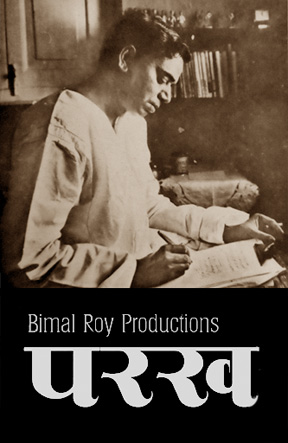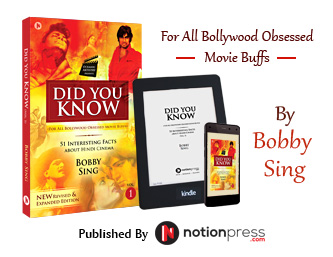
Living in the present decade of the 21st century, as a youngster it’s quite possible you might not be aware of the name SHAILENDRA or might not have read about his extensive works of the past. However, even if you were born in the new millennium, what’s simply not possible is that you haven’t heard any of his songs penned for Hindi Cinema (knowingly or unknowingly), as many of them can easily be quoted as anthems representing our film music within the country as well as abroad even in the present era.
Having said that, this still isn’t any introductory or ‘remembrance article’ on the maestro as almost everyone known for writing on Hindi cinema has already written a lot on Shailendra, also lovingly addressed as KAVIRAJ, the name given to him by the renowned writer-actor-director Raj Kapoor.
Hundreds of articles have been published in print and online talking about his songs and history of his illustrious career, right from his first meeting with Raj Kapoor at a poetry recital, his first release BARSAAT in 1949, his loving friendship with Raj, Shankar-Jaikishan, Hasrat Jaipuri, his splendid work with other magical creators like Salil Chowdhury and S.D. Burman, his bitter attempt at filmmaking resulting in a classic (TEESRI KASAM) and his death at the age of 43 on the day of Raj Kapoor’s birth anniversary, before their film together got a reputed National Award.
Many close associates and friends have written extensively on the amazing anecdotes, how many memorable songs got derived from their sweet & sour mutual conversations like Chhoti Si Yeh Duniya, Mud Mud Ke Na Dekh, Khoya Khoya Chand, the immortal songs of GUIDE and the incomplete theme song of MERA NAAM JOKER, Jeena Yahan Marna Yahan - later completed by his young son, Shelly Shailendra in his teens.
So when so much has been already penned about the maestro, what is left is the question. And why I am writing the title “The one facet of the maestro rarely discussed and written about!"
The reason for writing this is Bimal Roy’s film PARAKH, for which Shailendra not only wrote the lyrics for priceless gems as O Sajna Barkha Bahar Aayi, but also wrote the dialogues, the only film for which he wrote them in his entire career.
The poet-lyricist was known for the way he could express even deep philosophical thoughts without using any difficult words of either Hindi or Urdu. And he does exactly the same in the dialogues of PARAKH too, simply narrating the thoughtful, enlightening plot of the film that was all about finding the most honest or the best man in the village. The film is a satirical take subtly commenting on various social issues as poverty, caste-divisions, exploitation by the privileged, superstitions and fake religious beliefs, for which it can easily be quoted as ‘a comparatively bold & unusual film’ coming from the banner of Bimal Roy Productions.
Shailendra beautifully expressed his director’s vision of a satire through his simple yet effective dialogues that sadly couldn’t find any strong mention in any of writings on PARAKH, I went through before writing this piece.
Though his literary works always remained in the shadow of his film-song lyrics (Raj Kapoor actually got impressed with his poem “Jalta Hai Punjab”), the soul of a fiery poet thinking about the society could always be seen in his verses and the same was also visible in the dialogues of PARAKH that interestingly had the reference of a village election being held to choose the most honest or best person.
Sharing a few worth noticing dialogues from the film,
as it begins with a sequence at the local post-office, the post-master (Nazir Hussain) asks looking at a huge pile of letters brought in,
“Aaj lagta hai bahot daak aa gayi!”
To this the postman (Moti Lal) replies,
“Jaante hain yeh kyon hota hai? Isliye hota hai ke log padh bahot rahey hain. Naukri vaukri kuchh milti nahin, isliye arziyaan likhte rehte hain”
Now for a moment just visualize the above lines with reference to the present scenario, wherein a big percentage of our population extensively reads and writes on social networks and whats app, spending a substantial part of their precious time in an unaware state.
-----
A little while later in the film, as the news of finding the most honest or best man of the village starts spreading, a villager innocently asks,
“Gaon Mein Kaun Hai Sabase Achha Aadmi?”
Listening this, the wise man (Moni Chatterjee) replies,
“Agar Duniya Mein Chain Se Jeena Chahtey Ho, To Tum Bhi Achhey Aadmi Ho, Main Bhi Achhaa Aadmi Hun, Yeh Bhi Achha Aadmi Hai, Sab Achhey Aadmi Hain."
And just after this line, a baul begins singing the song with the satirical words,
"Kya Hawa Chali, Baba Rut Badli,
Shor Hai Gali Gali,
Sau Sau Choohey Khaye Ke Billi Hajj Ko Chali
Kya Hawa Chali, Baba Rut Badli"
-----
As per the theme of the film, the day voting begins to choose the best person of the village, a confused villager again asks the vaid - the wise man saying,
“Samajh mein nahin aata vote kis baksey mein daalen”
To this, the reply comes as,
“Bhaiya aankh kar lo band aur parchi chhorh do, chooleh mein jaaye ya bhaadh mein baat ek hi hai”
Studying the simple yet effective dialogues of PARAKH, the first thought I had in mind was that why nothing has been written about this one hidden feature of Shailendra’s works in details, incorporated in any book or article till date.
Honestly, searching again, all I could find was a one-two line mention in a few published works stating that he also wrote the dialogues of PARAKH, but nothing else.
(It’s quite possible that I might have missed reading an article or getting hold of a book dedicating its few pages on the dialogues penned by the maestro. So if a friendly reader knows about any such book or article, then please do let me know mentioning the details in the comments sparing some of your precious moments.)
As an unconventional or experimental film, it’s said that PARAKH was initially planned as a song-less venture by director Bimal Roy with musical score by Salil Chowdhury who had also written its story. Hence Shailendra being an integral part of the team was assigned the responsibility of writing the dialogues. However, later a few noteworthy songs too became a significant part of the film that undoubtedly had to be penned by the one and only Kaviraj.
Surprisingly, even after such fabulous work in PARAKH, Shailendra never wrote dialogues in any later film, probably because he was more interested in concentrating on his gifted poetic expressions in particular that included both his lyrical and literary works.
Interestingly, the credits of PARAKH also have a mention of Dialogue Direction by Paul Mahendra, a feature you will find in a few films of Bimal Roy as well as Hrishikesh Mukherjee (who also began his career as a part of Bimal Roy Productions as a writer, editor and assistant director).
Reaching the concluding part of the write-up, addressing the young readers, though Shailendra was active in Hindi cinema during just two decades of 50s and 60s in particular, it’s actually impossible to sum-up any kind of history of Hindi film music without a prominent mention of Shailendra and his creations keeping them among the top-most bracket of them all. In fact, it will not be any exaggeration if a historian chooses to quote him as the most heard (both in the country and abroad), most appreciated and most respected lyricist till date who was truly loved and celebrated by even the fellow lyricists.
The maestro’s first film with Raj Kapoor got released in 1949 and he unfortunately died young at the age of just 43 in December 1966. So, in a career span of only 17 years (including the few initial years of establishing a name in the industry), Shailendra did such exceptional work that not only became a prominent part of our history, but also inspired multiple authors to write books with their own interpretations, published in the last few decades.
Honestly, if you look at it as a disciple then Shailendra’s message for the young and the next generations was pretty loud and clear focusing on quality instead of quantity, well-conveyed through his words as,
“Apni Kahani Chhorh Ja,
Kuchh To Nishaani Chhorh Ja,
Kaun Kahey Iss Aur, Tu Phir Aaye Na Aaye,
Mausam Beeta Jaye,
Mausam Beeta Jaye”
HIS BLESSINGS
Bobby Sing (Harpreet)
28th August 2020
Copyright – Bobby Talks Cinema.com
(Note : The write-up is a chapter shared from my upcoming book releasing soon. So any additions, rectifications suggested by friends are welcome to make it better.)
----------
 For more such interesting articles on lesser known facts on Hindi Cinema, do try DID YOU KNOW
For more such interesting articles on lesser known facts on Hindi Cinema, do try DID YOU KNOW Series by
Bobby Sing available in both Book and E-book form
.
Also available
at Notionpress and Flipkart stores (in India)
And at Amazon-com and Amazon-co-uk abroad.
The E-book available at Amazon Kindle, Google Play, I-Books and Kobo.


 For more such interesting articles on lesser known facts on Hindi Cinema, do try DID YOU KNOW Series by Bobby Sing available in both Book and E-book form.
For more such interesting articles on lesser known facts on Hindi Cinema, do try DID YOU KNOW Series by Bobby Sing available in both Book and E-book form.